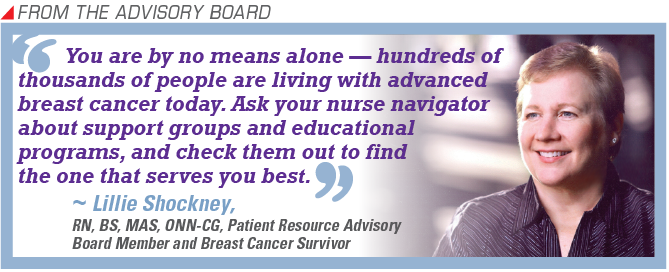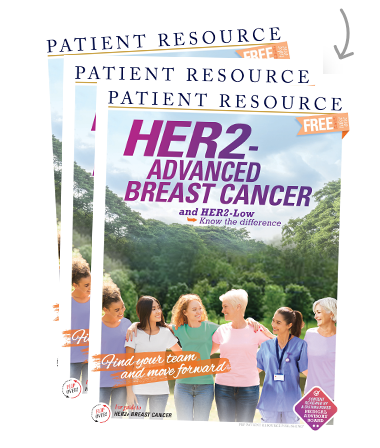HER2- Advanced Breast Cancer
Supportive care
Preventing, minimizing and managing the side effects of the cancer and its treatment is a primary focus of your multidisciplinary health care team. They will work together to make you more comfortable and enhance your quality of life. Knowing the side effects that may occur – and setting expectations for how to manage them if they do – will help you feel more prepared for treatment.
People facing cancer today have access to services that are designed to help improve their overall well-being before, during and after treatment. These services are known as supportive care or palliative care.
Palliative care is often confused with hospice care, but they are not the same. Palliative care can begin immediately after diagnosis and last throughout the cancer care continuum. Hospice care is more often used toward the end of life; however, it also has a key component of comfort care included in the services and programs that are offered.
You will work closely with palliative care specialists or other members of your health care team who are trained in side effect and symptom management. These services may be offered at a hospital, cancer center or medical clinic and can be adjusted as your needs change throughout treatment. Your family members, caregivers and others close to you can also benefit from this support. Palliative care specialists should be viewed as quality-of-life coaches who strive to preserve or restore your quality of life, which needs to be the priority for care.
Side effects can vary in intensity. While some are simply an inconvenience, others can disrupt your quality of life. Examples include nausea and vomiting or severe diarrhea that keeps you homebound or mouth sores that prevent you from eating and getting the nutrition your body needs, especially during cancer treatment. Still others may be serious or even life-threatening, making it critical that you know what to do if a potentially serious side effect occurs.
Prepare for Side Effects
Your health care team will rely on you to communicate openly about how you feel. Ask about the symptoms to watch for and what you should do if they happen. Some may require alerting the health care team immediately because treatment may help prevent more serious complications. Download a side effect tracker at PatientResource.com/Tracker.
Potentially severe side effects, also known as adverse effects, are uncommon but can occur with certain treatments. Ask your doctor whether you are at risk from the therapies in your treatment plan, how to identify the symptoms and when to seek emergency care. Report symptoms immediately so they can be treated right away. Prompt treatment can be life-saving.
Common physical side effects occur with many types of cancer treatment. Know that every person’s reaction is unique, even when the diagnosis and treatment are similar. Also, keep in mind that you likely will not experience all of the possible side effects. To see a list of common side effects, see Table 1.
Some of the most common physical side effects of HER2- advanced breast cancer treatment are nausea, vomiting, diarrhea, constipation, fatigue, hair loss and anemia. For an in-depth look at prevention and management of nausea and vomiting.
Late effects are side effects that develop weeks, months or years after treatment ends. If possible, talk with your doctor before you start a treatment about the symptoms to be prepared for and most concerned about.
Additional Supportive Care
Supportive care offers much more than physical relief. It is also designed to ensure your whole person is cared for, and that includes help with the emotional, practical, spiritual, financial and family-related challenges you may have. If you need help in an area not listed here, talk with a member of the team:
- Dietary support may be needed if you have challenges eating or with your appetite.
- Emotional support is available in many forms, both in person and online. Many organizations offer one-on-one buddy programs that pair you with another person who also has HER2- advanced breast cancer.
- Fertility support immediately following diagnosis may be necessary if you plan to have children in the future. Your fertility can be affected after a single treatment, and your preservation options will likely become much more limited as treatment goes on.
- Financial counseling is accessible from a social worker, nurse navigator or financial counselor.
- Spiritual or religious guidance may be available from a chaplain or spiritual care advisor at the hospital or in your religious community. Spiritual support is available to you even if you do not consider yourself a religious person.
- Transportation support is available for getting to and from cancer-related appointments. Support may be available from non-profit organizations, community transportation service programs, faith-based organizations and Medicaid.
Ask a member of your health care team for more information.




